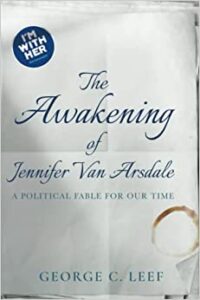A Fictional Progressive Gets Mugged
By Arnold Kling


- “But for some reason, the Dutch started to reject that traditional view of society in the sixteenth century. They entertained the idea that it was perfectly fine to trade and make profits. That new, liberal way of looking at life resulted in a rising standard of living in the Netherlands. It freed up human energy and ingenuity to pursue commercial gains, rather than confining them to furthering the interests of the rulers. Liberalism spread to England, then slowly, often incompletely, to other parts of Europe. The scholar you should consult if you really want to understand this is Professor Deirdre McCloskey.”
- —Spoken by Alexander Oistrakh, a character in The Awakening of Jennifer Van Arsdale: A Political Fable of Our Time, by George Leef.1
The Awakening depicts a dystopia in which progressives have undermined economic liberty, freedom of speech, rule of law, and fair elections. It is perhaps inevitable that readers will see it as a much shorter and more contemporary Atlas Shrugged. The equivalent of Ayn Rand’s Wesley Mouch character can be found in The Awakening as Patricia Farnsworth, a recent President whose biography Van Arsdale is solicited to write. The equivalent of John Galt may be found in Will Collier, an African-American who once served in the Navy and who helped start a group called Free People of Laguna Beach.
In her term of office, Farnsworth has succeeded in enacting most of the radical progressive agenda: policies that hamstring the labor market, including high minimum wages and laws against “gig work;” a focus on equity in education, at the expense of standards or rigor; gun confiscation; strict laws against hate speech; wasteful public works projects; regulatory strangulation of small business.
The libertarian/conservative Collier surprises the young progressive journalist Van Arsdale with his opposition to Farnsworth’s policies. He points out how they have resulted in increased poverty, crime, and social disarray.
Collier sees the progressive icon Farnsworth as nasty and hypocritical. He says,
- “This may sound cynical, but I think most politicians would have us remain poor and angry rather than successful and independent.”
Author Leef portrays progressive journalists as deliberately twisting the truth to promote progressive causes while progressive politicians deliberately commit fraud to win elections. His fictional progressives even admit to doing so.
Like Ayn Rand, Leef depicts political culture in black-and-white terms. Progressives are smug, ambitious, power-seeking, and blind to the adverse consequences of their policies. The conservatives and libertarians are good souls who are grounded in reality. As the novel unfolds, Van Arsdale comes to see the world through their eyes.
Leef has succeeded in meeting the challenges involved in writing a novel. Several years ago, I attempted a novel myself. My pacing was slow and ponderous. In about the same number of words that are in The Awakening, my novel was about one-quarter complete. Leef’s writing makes you want to turn the pages. Mine didn’t.
For more on these topics, see
 Arnold Kling on the Three Languages of Politics, Revisited. EconTalk.
Arnold Kling on the Three Languages of Politics, Revisited. EconTalk.- “Liberalism and Its Enemies,” by Arnold Kling. Econlib, Jun. 6, 2016.
- “Progressives’ Desires to Help the Poor Will End Up Hurting Them Instead,” by Craig J. Richardson and Richard B. McKenzie. Econlib, Sep. 6, 2021.
My slow pacing was in part deliberate. I wanted the evil of my progressive villains to emerge gradually. As it turned out, reality moved faster. My novel had campus progressives come up with a speech-suppression tactic in which a person whose views they did not like would be “branded.” A few years after I wrote my draft, the real world came up with cancel culture. My novel had a group of extremists starting to engage in violence. The real world came up with Antifa.
Let us hope that Leef’s fiction does not suffer a similar fate. At one point in The Awakening, the journalist notes that “prices are now increasing by fifty percent each year.” It would be tragic for the real world to turn out similarly.
*Arnold Kling has a Ph.D. in economics from the Massachusetts Institute of Technology. He is the author of several books, including Crisis of Abundance: Rethinking How We Pay for Health Care; Invisible Wealth: The Hidden Story of How Markets Work; Unchecked and Unbalanced: How the Discrepancy Between Knowledge and Power Caused the Financial Crisis and Threatens Democracy; and Specialization and Trade: A Re-introduction to Economics. He contributed to EconLog from January 2003 through August 2012.
Read more of what Arnold Kling’s been reading. For more book reviews and articles by Arnold Kling, see the Archive.
